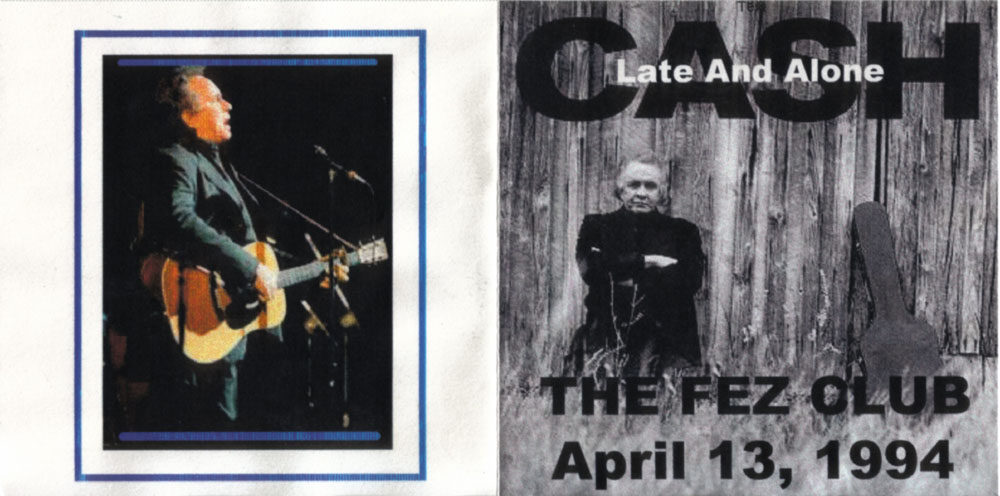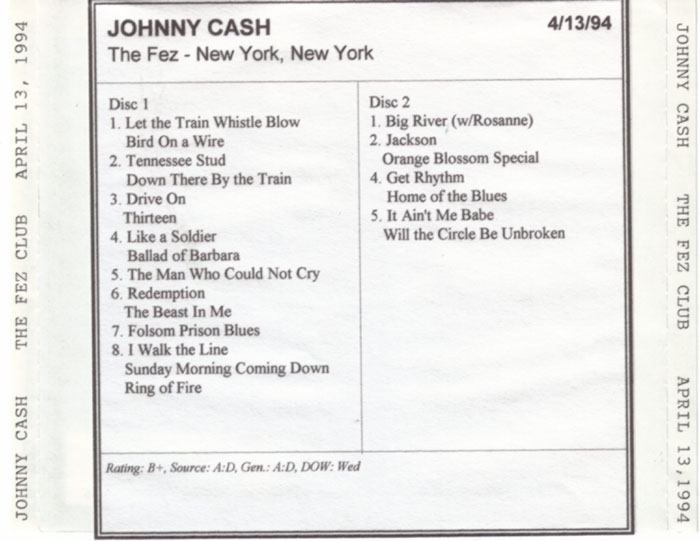2nd gen master tape > Unknown process > CDR>EAC>WAV>FLAC
Got a second gen master from the taper.. sent off to a friend Steve P up north who mastered it to cdr.. Unknown taping devices and equiptment....
Wonderful intimate show not widely circulated.. not the best Cash stelth recording, but since there won't be any NEW ones, essential for any Cash fan's collection..
Home made art included... enjoy!
Johnny Cash
The FEZ Club
New York City
April 13, 1994
Cash wanted to title his first American Recordings album "Late And Alone" well that did not happen and this recording has that feel... so here ya go Johnny... with love.
Disc 1
Let The Train Whistle Blow
Bird On A Wire
Tennessee Stud
Down There By The Train
Drive On
Thirteen
Like A Soldier
Ballad Of Barbara
The Man Who Would Not Cry
Redemption
The Beast In Me
Folsom Prison Blues
I Walk The Line
Sunday Morning Coming Down
Ring Of Fire
Disc 2
Big River (With Rosanne Cash)
Jackson
Orange Blossom Special
Get Rhythm
Home Of The Blues
It Ain't Me Babe (Dylan)
Will The Circle Be Unbroken


Review:
Johnny Cash, the country music legend, was all but washed up. Now he has a great record, improbably produced by a rock wunderkind.
BY CHRISTOPHER JOHN FARLEY
With reporting by Ken Myers/Kansas City
and David E. Thigpen/New York
There are two kinds of cool. There's the sugary, quickie cool you get from eating a Popsicle under a hot noontime sun. It's tasty and sharp, but it lasts only a few licks. Then there's the other kind of cool, the kind you get from resting in the shadow of a big oak tree on a summer day. That kind reaches down to your bones, and it even touches your soul: that old oak tree is noble and enduring.
Johnny Cash is oak-tree cool. The 62-year-old singer and songwriter has sold more than 50 million albums in 40 years. His signature songs - I Walk the Line, Ring of Fire - are classics. Despite his achievements, though, the past few years have been hard for Cash, and he has needed all his cool to persevere. His albums have sold poorly, and with the rise of young, easy-listening stars like Billy Ray Cyrus, record companies have lost interest in people like Cash. But now Cash has a label that's committed to him, and he has made a wise and beautiful new album. He has reasserted himself as one of the greats of popular music.
The new CD is called American Recordings - that's also the name of the label Cash has signed up with - and it was produced by 31-year-old music mogul Rick Rubin. It's hard to imagine a less likely collaboration than that between Cash and Rubin; on the surface, it seems as ill-advised a pairing as, say, Dan Rather and Connie Chung. Cash is a contemporary of Elvis Presley's and was once the host of a network variety show. Rubin is a hairy, ripped-jean-wearing studio virtuoso who has produced platinum albums for rappers like Run-D.M.C. and for the punk-funk band Red Hot Chili Peppers. As it happened, their different backgrounds didn't matter, for Cash and Rubin agreed on the most important thing: the sound they wanted. All you hear on American Recordings is Cash's guitar and his deep, sonorous voice. This is the way he has hoped to record for years, without the overproduction that plagues so much country music. Cash calls American Recordings his "dream album."
The theme of the record "is kind of sin and redemption," says Cash. On the CD's first track, Delia's Gone, Cash sings about the thin line between love and hate: "Delia, oh Delia/ Delia all my life/ If I hadn't shot poor Delia/ I'd have had her for my wife." Later he sings of salvation in the gospel-inflected Down There by the Train, describing a heavenly train for wrongdoers seeking righteousness: "There's no eye for an eye/ There's no tooth for a tooth/ I saw Judas Iscariot carrying John Wilkes Booth." Cash's voice has deepened with age; he has never sounded more commanding. The songs were written by a range of composers, including Cash, Kris Kristofferson and even hard rocker Glenn Danzig. Each one is moderately paced, simply arranged. Cash's guitar work is direct and intimate - an old cowboy strumming away around a dying campfire.
Sin and redemption are not just topics for Cash's songs; they're themes in his career. He grew up in the tiny town of Dyess, Arkansas (pop. 464). After signing with legendary Sun Records - Presley's first label - in 1955, he recorded such hits as Folsom Prison Blues before moving to Columbia Records in 1958. Cash remained with Columbia for almost three decades and produced a formidable string of hits. Along the way he married June Carter, of the Carter Family Singers, a country-gospel group; they have a son as well as several children by previous marriages. As Cash aged, he gradually fell out of favor with Columbia. Early in life he had spent a few nights in jail for unruly behavior under the influence of alcohol and pills, and in later years troubles with drug abuse also seemed to affect his work. Cash left Columbia for another record company in 1988 but ran into the same age problem. "I kept hearing about demographics until it was coming out my ears. You know, the 18-to-35," Cash says.
Cash knew he needed to make some changes, but he hardly expected to work with the likes of Rick Rubin. When Rubin first called Cash's manager, Cash had never heard of him or the bands whose records he had produced, except the Red Hot Chili Peppers. The lack of familiarity was somewhat mutual. Rubin admits that he doesn't listen to much country music but says he was interested in Cash from a "mythological" standpoint. "I don't see him as a country act," Rubin says. "I would say he embodies rock 'n' roll. He's an outlaw figure, and that is the essence of what rock 'n' roll is." When he made his pitch, Rubin was persuasive. "He immediately made me understand and believe that he really wanted to get the best out of me as an artist," says Cash. "There would be no clock in the studio; there would be no limit on the budget for recording or promotion. And that sounded good. I hadn't heard that since '70."
The production of American Recordings was high-concept and low-tech. The taping was done in Cash's cabin in Tennessee and the living room of Rubin's house in Los Angeles. "We recorded more than 70 songs in nine months, maybe closer to 100," says Cash. "Just everything I knew. I got into areas of music that ((Rubin)) wasn't familiar with, like country gospel, black gospel, country blues, Appalachian mountain music." In the end, just 13 of the songs were selected for the finished album.
Rubin and his record label are working hard to market their new star and to convince the 18-to-35s how cool Cash really is. (This is not a new idea: in 1968 a Columbia Records press release panted that Cash had finally "been discovered by the underground.") To heat up interest, the label arranged tiny, invitation-only concerts for the record-industry elite and young celebrities like Johnny Depp. MTV has not been overlooked - Cash has made a video of Delia's Gone in which he stars with model Kate Moss, the barely 20-year-old waif goddess. Cash is even considering playing on the Lollapalooza alternative-music tour. Despite all the hype, Cash has remained remarkably serene and even seems a little oblivious to where the record company is sending him. In New York City he performed at an ultrahip club called Fez; Cash refers to the venue as "The Fez."
Cash's daughter Rosanne, also a singer, says of her father, "Right now, he seems calmer than I've seen him in a long time. He seems right with himself." And he seems right with the fans, in all their variety. At a Saturday-night show in a Presbyterian church in Kansas City, Missouri, which began and ended with a prayer by the pastor, the fiftyish audience in rhinestones and T shirts responded wildly when Cash gave his trademark greeting, "Hello, I'm Johnny Cash." After the performance, Cash returned to his swank hotel, where a guest in a tuxedo called out, "Hey, Mr. Cash, welcome to Kansas City!" Then there was Dave Sheridan, a college student who attended a Cash concert in Columbia, Missouri, last week: "I'm hooked. Good music is good music," he said. "This guy's been around 40 years. That's the test." That old oak is still standing, more noble than ever.

